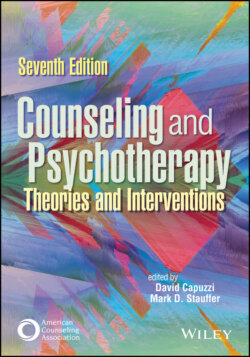Читать книгу Counseling and Psychotherapy - Группа авторов - Страница 132
Modern Presuppositions and Objectives
ОглавлениеPresuppositions. As theorists evolved the commonly held views and ideas of the traditional psychoanalytic approach, modern psychodynamic thought focuses on four major presuppositions: (a) Unseen forces behind the sciences are influential, (b) personality shapes experiences, (c) the past is powerful, and (d) psychic determinism is real (Fulmer, 2018). Unseen forces, including biological drives and impulses, psychological motivations, and cultural pressures expressed by clients, suggest a neural basis for the unconscious responsible for self-defeating thoughts. The client’s personality influences and shapes their development, defense processes, and manifestation of mental disorders, all of which are influenced by early attachment experiences. Repeating behaviors indicate that ruminating on past experiences impedes current coping skills. And psychic determinism is the concept that a client is unable to be present and have autonomy because of influences of past experiences, which leave the client with little self-determination (Fulmer, 2018).
With these four presuppositions, modern psychodynamic theorists further substantiate the importance of the unconscious on biological impulses and psychological motives (Berlin, 2011). Additionally, a reexamination of personality illuminates the biopsychosocial philosophy that guides the exploration of the systemic nature of one’s personality (Fulmer, 2018; Lingiardi et al., 2015). Although the past is still powerful according to the modern psychodynamic approach, clinicians attempt to have clients live freely in the present. However, living in the present, the here and now, is difficult because of the immense force the past has on the present and the future. The past may be observed in the present through transference and countertransference (Fulmer, 2018). Last, modern psychodynamic theory understands the weight of the past and its often tremendous hold over the conscious mind. Therefore, there is a need for both cognitive and emotional awareness so that one has autonomy over one’s life (Fulmer, 2018; Rutan et al., 2014).
Objectives. Just as the presuppositions help to provide a theoretical and conceptual underpinning of the modern psychodynamic approach, the objectives focus on the actual goals and accomplishments in session. The objectives of current psychodynamic approaches rest on the client’s development of insight, and counselors engage clients in recognizing and embracing choices to think and behave differently. Counselors also help clients holistically understand their past experiences and realize that the past has shaped their coping skills, and that they may develop healthier skills after achieving insight. And while clients develop an improved interpersonal relational style throughout this process, counselors provide an emotional corrective experience by distinguishing cognitive and emotional understanding of the interpretations of their drives and motivations.
The five objectives of modern psychodynamic theory are (a) the development of insight, (b) the expansion of choice, (c) liberation from the past, (d) improvement of interpersonal relationships, and (e) the corrective emotional experience (Fulmer, 2018). The focus of modern psychodynamic approaches remains insight-oriented, developing both cognitive and affectual insight (Fulmer, 2018; Rutan et al., 2014). In line with developing insight, counselors attempt to expand on the notion of client choice, consistent with the idea of psychic determinism. Counselors will work with clients in session to focus on making decisions from a more mature and rational mind-set (Cabaniss et al., 2011; Fulmer, 2018).
The past is still recognized as an important aspect of the work; many modern psychodynamic counselors understand how past experiences may shape current situations. However, counselors attempt to move beyond the past and break clients of the emotional bonds that the past may have on their lives, bringing the issues to the here and now. By doing so, counselors seek to emphasize holism in their work, recognizing that clients do not live in a vacuum. Counselors believe that the interaction with others lend itself to creating issues; therefore, seeking to improve interpersonal relationships will greatly improve one’s life. Finally, modern psychodynamic counselors focus on developing a corrective emotional experience in session, when clients can openly discuss their problems and develop solutions to these problems. However, modern psychodynamic counselors understand the importance of working through addressing the emotion that may drive the client’s problems (Fulmer, 2018).
